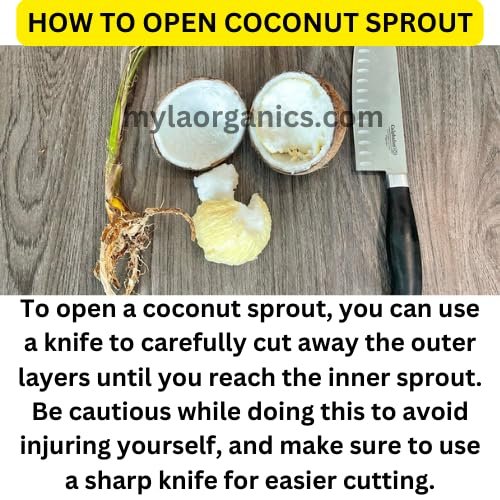Category Archives: Blog
HOW TO CULTIVATE COCONUT SPROUT
Myla organics Cultivating coconut embryos, also known as embryo culture or somatic embryogenesis in coconuts, is a technique primarily used in plant tissue culture to propagate coconut palms. This process allows you to produce a large number of plants from a single embryo, typically in a controlled laboratory environment. However, it’s a complex and specialized procedure that requires proper equipment, sterile techniques, and an understanding of plant physiology. Here’s a general overview of how coconut embryos can be cultured:
Steps to Cultivate Coconut Embryos:
1. Selection of Coconuts and Embryo Preparation
- Choose mature coconuts: Use fresh, mature coconuts that have a well-formed embryo inside. These coconuts are typically between 10-12 months old (fully matured but not dried).
- Disinfect the coconut: Clean the coconut surface thoroughly and disinfect it with a mild disinfectant like 70% ethanol to prevent microbial contamination.
- Extract the embryo: Open the coconut and remove the endosperm (the coconut water and meat). Carefully extract the embryo (young plant) from inside the coconut.
2. Sterilization of the Embryo
- Place the coconut embryo in a sterile environment. This is crucial to prevent fungal and bacterial infections.
- Sterilize the embryo by soaking it in a disinfectant solution, such as sodium hypochlorite (bleach) or mercuric chloride, typically for 15–20 minutes.
- Rinse the embryo thoroughly with sterile water to remove any residual disinfectant.
3. Embryo Culture Medium Preparation
- Prepare a sterile nutrient medium in which the coconut embryo will grow. This typically includes:
- Murashige and Skoog (MS) medium: A commonly used plant tissue culture medium that contains a balanced mix of macro and micronutrients, vitamins, and plant growth regulators.
- Auxins and Cytokinins: Plant growth regulators like 2,4-D (auxin) and BAP (cytokinin) are added in specific concentrations to promote callus formation, differentiation, and embryo development.
- Agar: A gelling agent to solidify the medium.
- Sterilize the medium and pour it into sterile culture vessels like petri dishes or test tubes, and then autoclave to ensure sterility.
4. Inoculation of the Embryo
- Place the sterilized coconut embryo onto the prepared nutrient medium under sterile conditions (typically in a laminar flow hood).
- The embryo will initially form a callus (a mass of undifferentiated cells). This callus can eventually develop into a shoot and root, which are necessary for plant regeneration.
5. Inducing Shoot and Root Development
- Culture Conditions: Place the culture vessels in a controlled environment with the right temperature (around 25–28°C) and light conditions (light intensity of about 16 hours/day).
- Over time, the embryo will start to develop shoots and roots. This can take several weeks to months, depending on the species and the conditions.
- Adjust the concentrations of growth regulators in the medium to promote the development of shoots (cytokinins) or roots (auxins).
6. Subculturing
- Once shoots and roots have developed, transfer the growing plantlets to a new, fresh medium to promote continued growth.
- This process is called subculturing and may need to be repeated several times until a healthy, robust plantlet is ready.
7. Acclimatization
- Once the plantlet has developed enough, remove it from the sterile tissue culture environment and begin acclimatizing it to external conditions.
- Gradually transfer the plantlets to a greenhouse or controlled outdoor environment with proper humidity and temperature.
- The plantlets will need to be hardened off to adapt to the natural environment, usually over a period of a few weeks, by slowly reducing humidity and increasing exposure to sunlight.
8. Transplantation to Soil
- After the plantlets have acclimatized, transplant them into soil or other growing media.
- Ensure that they are well-watered and protected from extreme weather conditions until they are well established.
Challenges in Coconut Embryo Culture:
- Contamination: This is a significant risk in tissue culture; maintaining sterility is crucial.
- Slow Growth: Coconuts are relatively slow to develop in culture, and it may take several months to even a year for embryos to mature into transplantable plants.
- Embryo Viability: Not all embryos may be viable for tissue culture, and the success rate can vary depending on the maturity of the coconut and the technique used.
Alternative Methods:
- Vegetative Propagation: While embryo culture is a powerful technique, it’s quite labor-intensive and requires advanced knowledge. Other forms of propagation, like somatic embryogenesis, micropropagation, or vegetative propagation via shoot cuttings, might be easier methods for large-scale coconut production.
Conclusion:
Coconut embryo culture is an effective but complex method of propagating coconuts, offering benefits like disease-free plants and the ability to propagate elite or hybrid varieties. However, it’s a technique that requires specialized knowledge of plant tissue culture, sterilization techniques, and environmental control.
Healthy life by MYLAORGANICS
Embracing Organic Living with MylaOrganics: The Wonders of Coconut
Welcome to the MylaOrganics blog, where we celebrate the beauty of organic living and the incredible health benefits of nature’s gifts. Today, we’re diving into the fascinating world of coconut—specifically, the coconut sprout, coconut embryo, and coconut flower. These natural wonders not only enhance our diets but also promote a healthier lifestyle.
The Power of Coconut in Organic Nutrition
Coconuts are a versatile superfood packed with nutrients. From coconut water to coconut oil, every part of the coconut offers unique health benefits. At MylaOrganics, we emphasize the importance of incorporating natural foods into your diet, and coconuts are at the forefront.
1. Coconut Sprout: A Nutritional Treasure
Coconut sprouts are the young shoots that emerge from germinated coconuts. These tender greens are rich in vitamins, minerals, and antioxidants. They have a delicate, nutty flavor, making them a perfect addition to salads or smoothies. Packed with fiber, coconut sprouts aid digestion and support a healthy gut.
2. Coconut Embryo: The Ultimate Health Booster
The coconut embryo, often found inside young coconuts, is a creamy, nutritious substance. It’s known for its high-fat content, primarily healthy saturated fats that provide energy and support brain health. The coconut embryo is also a great source of electrolytes, making it ideal for hydration after workouts. You can enjoy it fresh or blend it into your favorite dishes for a creamy texture.
3. Coconut Flower: Nature’s Sweetener
Did you know that the sap from the coconut flower can be harvested to create a natural sweetener? Coconut sugar is a fantastic alternative to refined sugars, containing essential minerals like iron, zinc, and calcium. It has a lower glycemic index, making it a healthier option for those monitoring their blood sugar levels. Use coconut sugar in baking, coffee, or even as a topping for oatmeal to enhance your meals naturally.
How to Incorporate Coconut into Your Organic Lifestyle
Incorporating these coconut components into your diet is easier than you think! Here are some delicious ideas:
- Smoothie Bowl: Blend coconut water with fruits, then top with coconut sprouts for a refreshing breakfast.
- Salad Delight: Toss together a salad with fresh greens, diced coconut embryo, and a drizzle of coconut flower nectar for a sweet touch.
- Coconut Rice: Cook rice in coconut water for added flavor and nutrition, then mix in some sautéed coconut sprouts.
Conclusion
At MylaOrganics, we believe that embracing organic living starts with understanding the natural foods around us. By incorporating coconut sprout, coconut embryo, and coconut flower into your diet, you can enjoy the multitude of health benefits they offer. Join us on this journey to a healthier, more vibrant life, and let’s celebrate the wonders of nature together!
For more tips on organic living and natural health, stay tuned to the MylaOrganics blog. Let’s nourish our bodies with the goodness of nature!
myla organics coconut sprout health benefits
Unlocking the Health Benefits of Coconut Sprouts
Coconut sprouts, often overlooked in the realm of superfoods, are emerging as a nutritional powerhouse packed with health benefits. These tender shoots, derived from germinated coconut seeds, are not only delicious but also brimming with essential nutrients. In this blog, we’ll explore the myriad health benefits of coconut sprouts and how you can incorporate them into your diet.
What Are Coconut Sprouts?
Coconut sprouts are the young shoots that emerge from germinated coconut seeds. This process typically takes about 3 to 4 weeks, during which the coconut develops its sprout while absorbing moisture and nutrients from its environment. The result is a tender, crunchy shoot that can be eaten raw or cooked.
Nutritional Profile
Coconut sprouts are rich in a variety of nutrients, including:
- Vitamins: They are a good source of vitamins C and E, both of which are powerful antioxidants that help protect the body from oxidative stress.
- Minerals: These sprouts are rich in potassium, magnesium, and calcium, essential for maintaining healthy body functions.
- Fiber: They provide a good amount of dietary fiber, which aids in digestion and helps maintain gut health.
- Healthy Fats: Coconut sprouts contain medium-chain fatty acids, which can be beneficial for heart health.
Health Benefits
1. Boosts Immunity
The high vitamin C content in coconut sprouts can help strengthen the immune system. Vitamin C is known for its role in promoting the production of white blood cells, which are crucial for fighting off infections.
2. Supports Digestive Health
With their significant fiber content, coconut sprouts can aid digestion by promoting regular bowel movements and preventing constipation. Fiber also acts as a prebiotic, nourishing the beneficial bacteria in your gut.
3. Enhances Skin Health
The antioxidants present in coconut sprouts, particularly vitamins C and E, can promote healthy skin by combating free radicals and reducing the signs of aging. Regular consumption can lead to a clearer, more radiant complexion.
4. Promotes Heart Health
Coconut sprouts contain healthy fats, including medium-chain triglycerides (MCTs), which are known to support heart health by improving cholesterol levels and reducing the risk of heart disease.
5. Aids in Weight Management
Low in calories and high in fiber, coconut sprouts can be a great addition to a weight management plan. They provide satiety, helping you feel full longer and reducing the likelihood of overeating.
6. Improves Bone Health
The calcium and magnesium found in coconut sprouts are essential for maintaining strong bones. Including them in your diet can contribute to better bone density and help prevent osteoporosis.
How to Incorporate Coconut Sprouts into Your Diet
Coconut sprouts can be enjoyed in various ways:
- Salads: Add fresh coconut sprouts to salads for a crunchy texture and a nutty flavor.
- Smoothies: Blend them into smoothies for an extra nutrient boost.
- Stir-fries: Toss coconut sprouts into stir-fries for a nutritious addition.
- Wraps: Use them as a filling in wraps or sandwiches for added crunch.
Conclusion
Coconut sprouts are a versatile and nutritious addition to any diet. With their impressive health benefits and delicious taste, they deserve a spot on your plate. So, the next time you’re looking for a new ingredient to boost your meals, consider incorporating coconut sprouts for a delightful and healthful twist!
coconut sprout/cooconut flower benefits
Coconut sprouts, also known as coconut shoots or coconut hearts, refer to the tender, newly emerging shoots of the coconut palm tree. These sprouts have several potential benefits:
- Nutritional Value: Coconut sprouts are rich in vitamins, minerals, and phytonutrients. They contain vitamins C, E, and B-complex, as well as minerals like potassium, magnesium, iron, and zinc.
- Dietary Fiber: They are a good source of dietary fiber, which is essential for maintaining digestive health and preventing constipation.
- Low in Calories: Coconut sprouts are relatively low in calories, making them a suitable addition to weight management diets.
- Antioxidant Properties: These sprouts contain antioxidants such as phenolic compounds, which help neutralize harmful free radicals in the body, reducing oxidative stress and lowering the risk of chronic diseases.
- Hydration: Coconut sprouts have a high water content, which helps keep the body hydrated, especially in hot climates.
- Potential Prebiotic Effects: Some research suggests that the fiber in coconut sprouts may act as a prebiotic, promoting the growth of beneficial gut bacteria and improving digestive health.
- Versatility: Coconut sprouts can be incorporated into various dishes, including salads, stir-fries, soups, and curries, adding a crunchy texture and a mildly sweet flavor.
- Sustainable: Utilizing coconut sprouts helps reduce waste in coconut farming practices since they are often discarded during the harvesting process.
coconut flower , coconut sprout , coconut embryo health benefits

Coconut flower, also known as coconut sprouts or coconut apple, refer to the young, gelatinous tissue found inside a coconut. This part of the coconut develops into a coconut palm. While coconut flower are not as commonly consumed as mature coconut meat or coconut water, they do offer some potential health benefits. It’s important to note that research on coconut embryos specifically is limited, and much of the information is based on the nutritional composition of coconut in general. Here are some potential health benefits associated with coconut embryos:
Rich in Nutrients: Coconut sprout contain essential nutrients such as vitamins, minerals, and antioxidants. These include vitamin C, B-vitamins, iron, phosphorus, and potassium.
Antioxidant Properties: Antioxidants help protect the body from oxidative stress and damage caused by free radicals. Coconut flower may contain antioxidants that contribute to overall health.
Hydration: The gelatinous texture of coconut embryos suggests a high water content, which can contribute to hydration. Adequate hydration is essential for various bodily functions.
Potential Anti-Inflammatory Effects: Coconut products, in general, are known for their potential anti-inflammatory properties. This could be attributed to certain compounds present in coconut embryos.
Supports Immune Health: The vitamins and minerals found in coconut flower, such as vitamin C, may contribute to immune system support. A healthy immune system is crucial for overall well-being.
Digestive Health: Coconut sprout might contain dietary fiber, which is beneficial for digestive health. Fiber helps regulate bowel movements and supports a healthy gut.
Heart Health: While more research is needed, some studies suggest that the consumption of coconut products may have a positive impact on heart health by improving cholesterol levels and reducing the risk of cardiovascular diseases.
It’s important to consume coconut embryos in moderation, as they are calorie-dense due to their fat content. Additionally, individuals with nut allergies should be cautious, as coconuts are considered a tree nut. As with any food, it’s advisable to consult with a healthcare professional or nutritionist for personalized advice based on individual health conditions and dietary needs.



